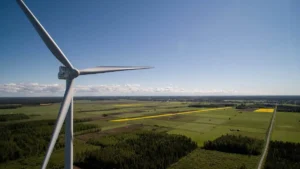If Democratic presidential candidate Joe Biden loses to incumbent US president Donald Trump in November’s general election, the United States’ ability to decarbonise before 2050 will be all but nullified.
This is the conclusion of new research from global energy analysts Wood Mackenzie, which claims that “the outcome of the 2020 US presidential election will dictate the pace of decarbonisation for decades.”
“If Biden’s bid fails, the US will forfeit four more years in the fight against climate change,” says Dan Shreve, Wood Mackenzie Research Director. “This would dramatically reduce the possibility of eliminating carbon emissions from the region’s power grid before 2050.”
Joe Biden, the former vice president to Barack Obama, and long-time member of the US Senate, is in the middle of his third and most successful run for the US presidency.
Polling suggests Biden is in a strong position, but given the political climate of the United States, everything could turn on its head seven times over before the election comes to a close.
During the Democratic primaries, Biden unveiled a $US1.7 trillion climate plan which was met with almost resounding apathy and disappointment.
Upon locking up the nomination, Biden’s team worked with supporters of defeated rival Bernie Sanders on a number of policy issues as part of the Biden-Sanders Unity Task Force.
The resulting $US2 trillion climate plan – one plan amongst several policy plans the Task Force rolled out – was met with much greater support and enthusiasm. “We’ve seen a pretty huge transformation in Biden’s climate plan,” said Varshini Prakash, co-founder and executive director of the Sunrise Movement, which awarded Biden’s original climate plan an “F” rating.
“What I’ve seen in the last six to eight weeks is a pretty big transition in upping his ambition and centering environmental justice,” she said in early August.
The plan, much more aggressive and extensive, called for the elimination of carbon pollution from the power sector by 2035, an unsurprising rejoining to the Paris Climate Agreement, and the installation of 500 million solar panels within five years.
“These are the most critical investments we can make for the long-term health and vitality of both the American economy and the physical health and safety of the American people,” Biden said at the policy launch.
“When Donald Trump thinks about climate change, the only word he can muster is ‘hoax.’ When I think about climate change, the word I think of is ‘jobs.’”
Unsurprisingly, according to energy analysts Wood Mackenzie, if Joe Biden does not walk out of this November’s election with the presidency, America’s decarbonisation efforts will take a massive hit.
“If Biden’s climate plan comes to pass, it will have widespread consequences for the US power sector,” said Dan Shreve.
Conversely, if Donald Trump is re-elected, he will be virtually unchecked in his efforts to erase all policy memory of Barack Obama and undo any pro-environment policies.
According to Wood Mackenzie, a Biden election win will see capital investments in renewable energy and energy storage assets exceed $US2.2 trillion ($A2.99 trillion) through 2035 – a massive long-tail benefit to the industry.
Utility-scale solar demand will skyrocket to over 100GW per year while battery storage capacity will surpass 400GW – accounting for nearly 40% of the total installed power generating capacity of the US in 2020.
Moreover, Wood Mackenzie expects a Biden win would lead to coal-fired electricity generation exiting the market altogether.
However, even if Biden is elected, to implement any of his bold Democratic policies, he will need to bring with him enough of a ‘blue wave’ so as to sweep away Republican power in the Senate.
Without a shift in Senate leadership, the Republicans will be able to roadblock any and every policy they see fit.
Wood Mackenzie ask another question, however: If Biden is elected, and the Senate turns blue for the first time in a decade, is Biden’s aggressive climate plan achievable?
“Biden’s plan teeters between achievable and aspirational but the backing of energy sector giants could tip the balance and once again establish the US as a leader in the fight against climate change,” said Shreve.
“The deployment of 1.5 TW of renewable generation in less than 15 years is a daunting task. Doing so at that scale and speed would shake up the hierarchy of the energy industry and turn the power market on its head.
“Most production in the US is focused on assembly, with structural components and equipment imported from countries where manufacturing costs are low. But to satisfy Biden’s potential ‘Made in America’ requirements, domestic wind, solar and storage would need to expand rapidly.”
For example, current US-based solar module supply sits at only 4.7GW. Under Biden’s plan, US module supply would need to increase to over 100GW per year.
Similarly, Biden’s plan expects battery supply demand to reach 600GWh per year, vastly overshadowing the current figure which sits at around 46GWh.
“The oil and gas sector must carefully hedge against a failure of the carbon capture, utilisation and storage market to reach commercialisation,” said Shreve. “Failure to engage now may result in surrendering market position to a burgeoning club of energy majors in a zero-carbon future.
“Natural gas will drive around 40% of US power generation this year, consuming 33% of domestic gas supply.
Consequently, maintaining a presence in the US power sector is important to both gas suppliers and generators.
“Partnerships and acquisitions of upstart storage providers, renewable energy developers and green hydrogen technology suppliers must all be on the table,” added Shreve.








